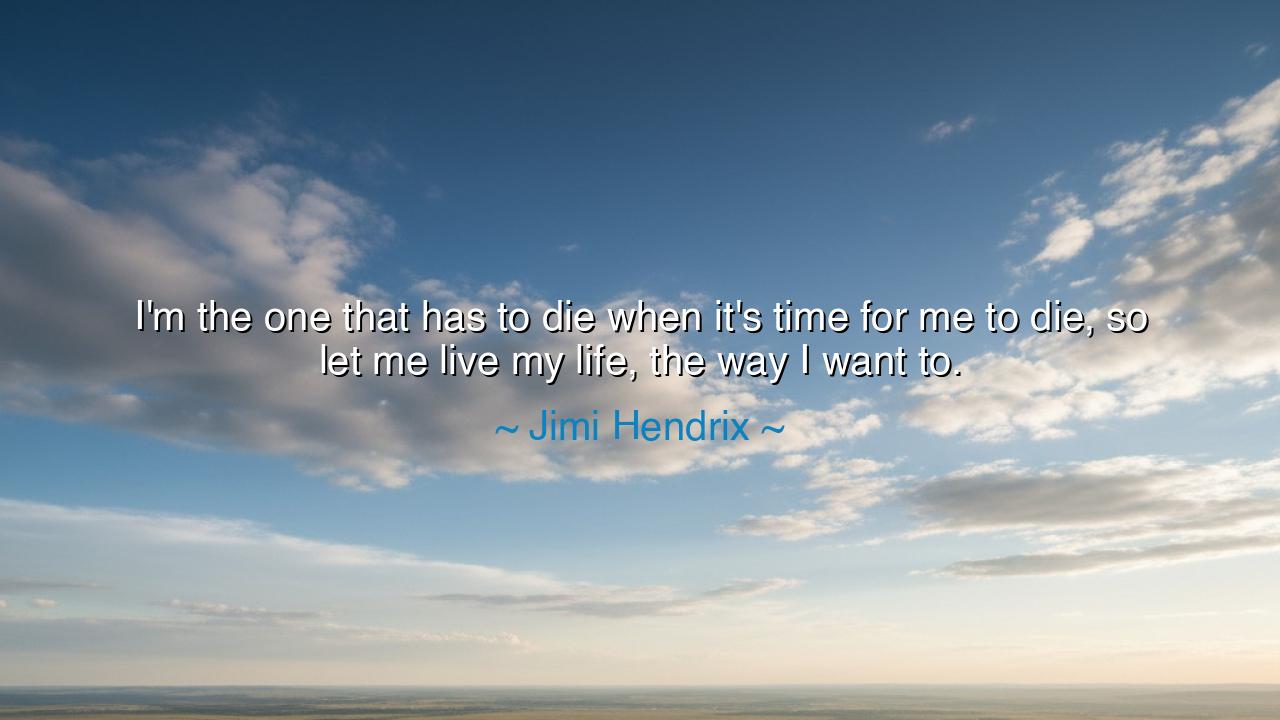
I'm the one that has to die when it's time for me to die, so let
I'm the one that has to die when it's time for me to die, so let me live my life, the way I want to.






“I’m the one that has to die when it’s time for me to die, so let me live my life, the way I want to.” Thus declared Jimi Hendrix, whose music thundered like a storm and shimmered like lightning upon the strings of his guitar. His words, though born of rebellion, are no less a sacred truth: each of us walks toward death alone, and because of this, each must claim the freedom to live fully, authentically, without apology. The chains of others’ judgments cannot bind the soul that remembers its mortality.
The ancients too knew this wisdom. The Stoics taught that death is the one certainty of life, and that fear of it enslaves men to the expectations of others. Yet Hendrix sharpened this truth into something more daring: if I alone must face my death, then I alone must command my life. To let others dictate one’s path is to surrender the only gift that is truly yours. For no man, no law, no tradition will stand beside you at the hour of your passing. Only your spirit will answer for how you lived.
Consider the life of Socrates. When condemned to death by the city of Athens for corrupting the youth and questioning the gods, he might have fled into exile. Yet he refused. “The unexamined life is not worth living,” he said, and so he drank the hemlock. He understood what Hendrix declared centuries later: that since it is he alone who must die, he must live by his own truth, even unto death. His calm acceptance of fate shook the world more than any sword could.
Hendrix himself was no philosopher of marble halls but a prophet of sound, unafraid to bend the rules of music until they screamed with new life. Many scorned him, saying his ways were too wild, too chaotic, too unrefined. Yet he did not bow. He lived as he played—fierce, untamed, unbound. Though his years were few, his flame was fierce, for he refused to trade authenticity for conformity. His very existence was testimony: better to burn true than to wither false.
O children of the future, take this to heart: you cannot live for others, nor should you. Their approval is fleeting, their judgment flawed, their understanding incomplete. But your life—your breath, your dreams, your choices—these are yours alone. Do not squander them in imitation. Do not bury them beneath the weight of fear. Live boldly, for you will die surely. And in that certainty lies your freedom.
The lesson is clear: honor death not with dread, but with life lived to its fullest. Ask yourself not how others would have you live, but what stirs your soul. Seek your music, your calling, your truth. Let your actions be guided not by fear of judgment, but by the knowledge that your time is finite and precious. And when the end comes, let your soul stand tall, able to say: “I lived as I was meant to live.”
Therefore, let your practice be this: choose with courage, speak with honesty, act with passion. Refuse to waste your days in the shadow of others’ expectations. Remember Hendrix’s wisdom: if you alone must face your death, then you alone must command your life. Do not delay, for the sands of time run swiftly.
So I say unto you: live as fire, not as ash. Be true to your spirit, unbound and unafraid. For when the final hour arrives, it will not matter how others judged you—it will matter only that you lived your life, the way you were called to live it.






AAdministratorAdministrator
Welcome, honored guests. Please leave a comment, we will respond soon